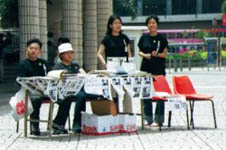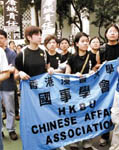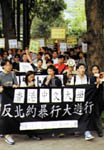Periscope |
Home | Archives | About | Media Links



October 1999
The Cream Churns
For years, the cream of the generation, namely university students, have been accused of knowing nothing but "eating, drinking, and being merry." Now the cream has churned.
By Grace Cheng, Kwong Sum Yin and Joey Yu
See also:
Silence is
Golden
Prof. Wu
Chia-wei: "Don't play to gallery"
"The Fire Red Period" was the phrase used to describe the university student movements in '70s as students were remarkably active in participating in social movements.
Later, university students lost their enthusiasm in social affairs and student movements gradually faded.
However, student movements seem to have revived with the advent of the new millennium.
There was a series of activities in 1999, such as the Anti-NATO parade and the June Fourth Movement commemoration activities. These activities put university students back in the spotlight.
"University students are not only supposed to study hard, but also be interested in current affairs," said Mr. Lau Kai Bun, 20, external vice-president of the University of Science and Technology Student Union.
Cheung Kwok Keung, 20, current affairs secretary of the Union, said, "We encourage students to participate in activities. Personal participation is important."
Added Mr. Lau: "We do not intend to instill in students our stance.
"Rather, we aim at letting them have a more comprehensive and thorough understanding of the issues."
Kevin Lee Yuen-hung, external vice-president of Hong Kong Baptist University Student Union, said that the aim is to raise students' awareness about social issues.
However, he admitted that students were uninterested in joining in these activities. "Maybe they think that the activities are not effective," said he.
Mr. Ken Yau Tze-ken, vice-president of the Student Union of The Chinese University of Hong Kong, said that it is difficult to judge whether or not involvement was effective.
"We do njot expect changes," he said. "I never think that we can change society.
A few university students went to Beijing to voice their opinion on the issue of the right of abode in June.
"Concerning the issue of the right of abode, I just jope that this can raise public awareness, let the government and the public know that some people do not agree with the government."
Mr. Lau of the Hong Kong University of Science and Technology said, "The success of an action depends on its timing.
"For example. the publicity for the Anti-NATO parade was inadequate. But the overall participation rate was satisfactory since the incident itself aroused public concern."
Besides, the nature of the incidents affect the responses and feedback from the students.
He said, "For issues that are highly controversial, there may be a great division of opinions. It is qute difficult to establish a consensus and gather student support for our actions.
"The evaluation of the success thus should not be based on the number of participants only."
Regarding the difficulties in organizing activities, Mr. Lee said the main one came from the administration, including inadequate publicity and helpers.
Said Mr. Yau of the Chinese University: "There has been no Student Union committee for this university for the past three academic years."
According to him, some ex-committee members are too stubborn. They are restricted in thei modes of thinking. Thus, they have had to learn on their own.
"The first step is to avoid being misguided by the mass media.
"Then we need to discuss (the issues) with scholars, social organization and our students."
Generally, university authorities do not exert pressure on student unions. "Our university authority is neutral as regards student movements and activities," said Mr. Cheung of the Hong Kong University of Science and Technology.
The president of the Chinese University Student Union is Parry Leung. He and Mr. Yau said that the university authorities do not interfere with student movements.
However, they said that, in general, such authorities were not politically neutral.
"The authorities at Hong Kong University have used administrative procedures to hinder the students on the campus," Mr. Yau said.
Late in the second semester, the Student Union of Baptist University wanted to send e-mails to students about the June Fourth Commemoration through Student Affairs, but their request was refused.
Mr. Lee said the reason was due to the quota limits for sending e-mail.
After that, they had an informal meeting with Student Affairs about it.
When asked whether there was interference from University authorities, he said, "There was none from our point of view. There were just technical problems."
As for their own leadership, Mr. Leung and Mr. Yau firmly rejected the title of "student leader".
"Organizing is the main aim of the Student Union," Mr. Leung said. "We just cultivate opinions from students who care about society."
"I don't afree with the term 'leader'. But I agree we are initiators and organizers of student compaigns," Mr. Cheung of the University of Science and Technology said.
Mr. Lee of Baptist University hesitated when asked whether he was a student leader. "Yes, I am," he said finally. "Student movements need to be led."
Mr. Leung of the Chinese University has not been satisfied with student movements these past few years.
"Student movement should be deep and long-lasting," he said, "Nowadays we just respond for each event and there is no active interaction with society."
Mr. Yau said students need to understand social problems on their own in order to be critical.
He said student movements were more influential in the past because university students were among the elite.
At that time, there were fewer political parties and students were conscience of society.
"But now student movements are less able to improve society," he said.
However, he is sure that university students have a certain role in society.
"The conditions are favourable enough for us to care about our society.
"Compared with political parties, university students need not face a conflict of interests, so they can look into the matter fairly.
"For example, in the issue of the right of abode of mainland immigrants, students need not face unemployment issues," he said. "Therefore they can think about long-term benefits."
Mr. Lau of the University of Science and Technology agreed. "University students are in a better position to launch student movement as they are less involved in political and social conflicts. They can think and analyse sensibly and independently."
Regarding criticisms regarding students' lack in experience, Mr. Lau of the Hong Kong University of Science and Technology said, "I agree that we are still inexperienced in organizing such kinds of activities. But I believe that experience can be accumulated gradually by trial and error.
"Also, I do not agree that today's university students are echoing other people's opinions and following the trend blindly."
Said Mr. Cheung: "For example, we organize June Fourth Movement commemoration activities to prompt students to have self-reflection, as it is an appropriate timing and is meaningful to hold the activities."
Mr. Lee of Baptist University agreed. "I think there are thorough planning and thinking behind these student movements," he said.
Mr. Leung said, "It is not objective to accuse students of following suit."
"Some of the criticisms were biased." said Mr. Cheung of the Hong Kong University of Science and Technology. "It is improper to compare today's university students with those in the '70s and '80s regardless of their difference in mentality."
Said Mr. Lau: "However, I think students are more concerned about society actually, but they seldom express their opinions.
"Actually, there are few channels available for them to voice their opinions.
"The year of 1997 was a turning point. The focus of our society shifts from politics to economics and people's livelihood.
"People are not familiar with the new sovereignty. Fear and uncertainty followed.
"This atmosphere also influences students. They refrain themselves from expressing their views.
"Students are perplexed by their emotional and study problems.
"Less time is available for caring about the social events. Still, they agreed that nowadays students had a sense of mission and commitment to society."
Said Mr. Cheung: "My mission is to raise this sense of mission among students."
A further criticism is university students are short-sighted.
However, Mr. Leung of the Chinese University said that most Hong Kong people are also short-sighted.
"It is unfair to pick university students out. Under the colonial system, we needed only executive but not a leader," he said.
Mr. Yau concluded, "A society led by the most short-sighted Chief Executive is definitely short-sighted."
Home | Archives | About | Media Links